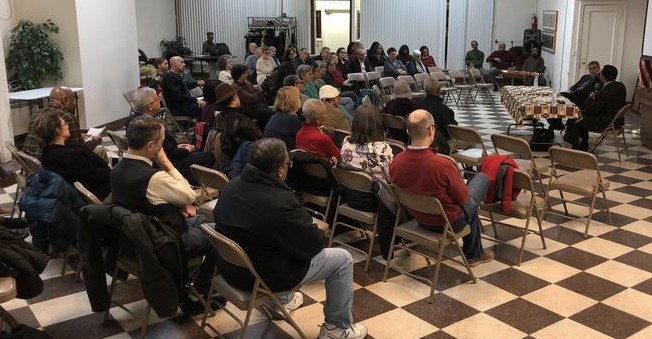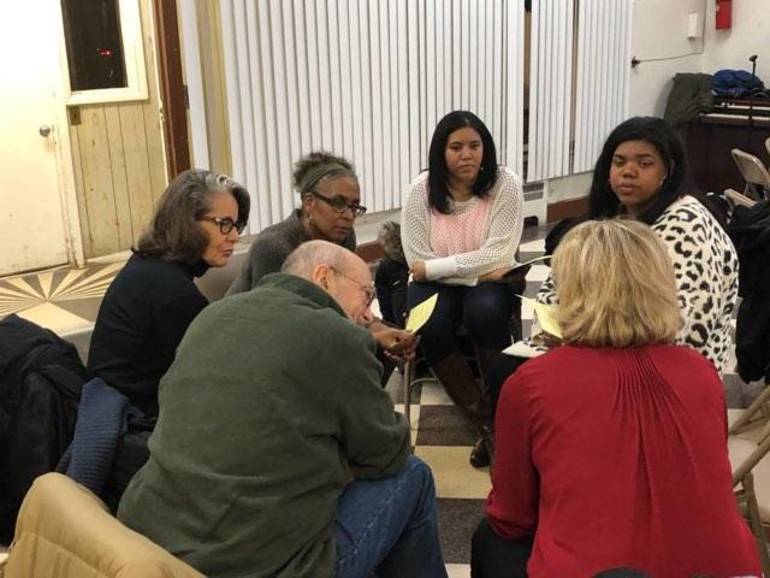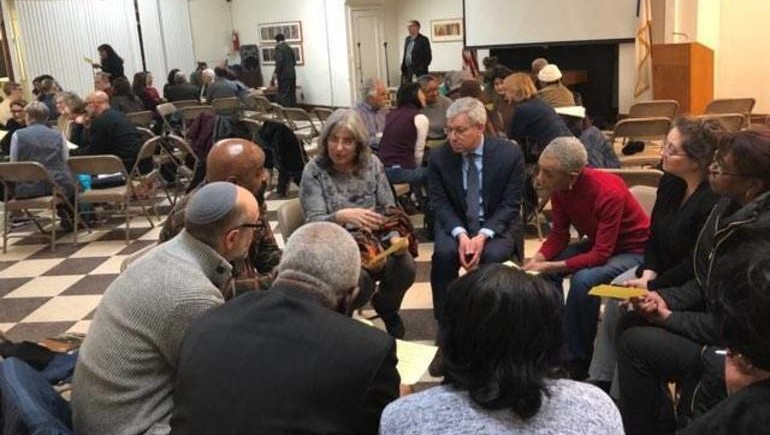 Sixteen Shomrei members attended a discussion about antisemitism and racism facilitated by Rabbi Greenstein and Pastor Singleton at Union Baptist Church on February 13. Several of the people who attended share their recollections and thoughts about the evening:
Sixteen Shomrei members attended a discussion about antisemitism and racism facilitated by Rabbi Greenstein and Pastor Singleton at Union Baptist Church on February 13. Several of the people who attended share their recollections and thoughts about the evening:
Miriam Haimes
Pastor Singleton welcomed the participants and immediately engaged everyone by asking which congregations were represented. Many local synagogue and church members were present. This brought a feeling of inclusiveness from the beginning. He then opened with a recitation of the Sh’ma noting that there is only one G-d regardless of how we worship or what we look like.
A question and answer between Rabbi Greenstein and Pastor Singleton ensued where each shared some history of hate. Rabbi Greenstein spoke about the history of the word antisemitism and that this was an invention of recent history. He noted that there is no such thing as semitism so the word should not be hyphenated. He also spoke about the long history of the Jewish people and their ability to survive after many struggles and attempts to wipe them out. Both the Rabbi and the Pastor spoke about the change in teaching regarding the death of Jesus and the Pastor explained that the Union Baptist Church of Montclair teaches that sin killed Jesus, not the Jewish people.
Pastor Singleton asked the Rabbi to explain about the Jewish people and also encouraged the participants to be hopeful and helpful rather than hateful and hurtful. The Pastor noted that education and awareness were key to understanding. Also there was discussion about understanding individuals as humans and not generalizing all people of a color or religion.
The participants then split into groups to answer some questions about racism and antisemitism. The group work was very rewarding as people shared personal stories and in a few short minutes shared experiences and some laughs as well. Understanding individual experience is key to “breaking the hate”.
While progress was made at the gathering in building connections, both the Pastor and the Rabbi agreed to continue the conversations and that they would get back to the participants with future plans.
Overall, the evening was a beginning for members of various local communities to begin to gain understanding of one another and each other’s struggles.
Ann Lippel
I realized that the most difficult thing we have to do in order to really understand the perspectives of other people is to listen. It is not so much listening to the words of someone with whom we happen to share the same physical space at any given moment- although surely the words give us the context for understanding – it is more listening beyond the words. Hearing the feelings that must have engendered the words -or sensing the expanse of time the speaker has been grappling with this notion – this helps me feel I am getting to know the speaker. If we can listen that way, we will naturally be reticent about reacting too quickly or making quick judgements. Listening is the challenging part; really knowing is the reward.
 Zelda Greenstein
Zelda Greenstein
Hate is an ugly word.
I think both the Rabbi and the Pastor made that very clear with their very honest approach to the discussions and I believe that what I experienced in my little group discussion was very affected by their approach and that a true attempt was made to erase the hate.
I would love to continue participating in this process.
Nick Levitin
For me the evening had an impact beyond anything I could have imagined. When we broke up into groups I was with 6 woman – 3 of whom were white and 3 who were African American. We were asked to respond to several written questions. One of them was how racism in Montclair had effected us. Two of the African American participants were young women, congregants of the Union Baptist Church where the meeting was held. The first spoke movingly about the pain she suffered as the result of growing up as “the other.” She spoke from from heart, more with a sense of puzzlement rather than bitterness or rage about the pain she had experienced. Most of what she said, I had heard before in documentaries or on television. But, here was someone sitting two feet from me telling me her story and it was devastating. How invisible she felt growing up in Montclair, with few if any among the white community who understood what it was like being viewed as so different. I was moved to tears. Her friend who was a light skinned African American shyly described what it was like growing up being referred to as “not like the others” “a good black.” Others in our groups also shared moving stories of their experiences. Although I think of myself as someone who knows about racism, the evening was a revelation to me. I was shaken and couldn’t return to “normal” life as if nothing had happened. I had been sensitized to something I had an intellectual understanding of, but not an emotional one.
Rabbi Greenstein’s talk about anti-semitism was also powerful. To hear him say that one of the origins of anti-semitism was the Church’s teaching that the Jews killed Jesus was something that I didn’t expect and went to the heart of how pernicious anti-semitism can be. Pastor Singleton was a warm, welcoming host committed to creating an atmosphere were people could be heard. It was an important evening. One which will lead to other evenings at different churches and synagogues around town. I hope that Shomrei members will make a major effort to attend. The times we live in demand that we challenge prejudice, not just by the way we think, but by our actions as well. Meetings like this have the possibility of not only changing the way we think, but creating community beyond our own where we can learn and grow together with our neighbors.
Click here for information about additional Break the Hate sessions
Photographs: Courtesy of Union Baptist Church
- Shabbat in Uzbekistan - Wed, Apr 17, 2024
- Purim in Uzbekistan - Thu, Apr 4, 2024
- Quick-ish Soups - Thu, Feb 22, 2024

